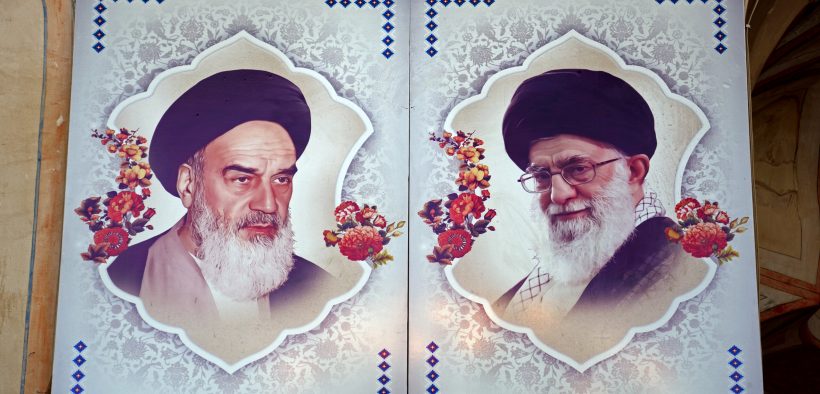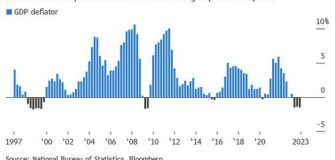We Are at War With Iran’s Mullahs
Share

Each morning for the last several days I’ve turned first for news concerning the two SEALs lost at sea off the coast of Somalia, hoping—by this moment, hoping against all hope—that they will somehow be found alive. I’ve been privileged over the years to know and work with a few members of this very small and very special community. I use the word “community” advisedly. It’s a term they often use to describe themselves, and, when one listens to them talk about each other, it seems exactly right—they are a true community, one built on shared values, shared experience, shared commitment to excellence. Surely, they are already hurting deeply as they contemplate the fate of their fellow SEALs. Surely, too, they are wishing that those responsible are held to account. For these are not simply the victims of an unfortunate accident—they are the casualties of war.
The bottom line is that, while the war has started, it remains containable, if only we make the effort to contain it.
Every true American should be saddened at their probable fate, even as we pray for a miracle. And every true American should wish, passionately, that the authors of this fate are held to account. We might start by honestly facing up to “an inconvenient truth” for the Biden administration, a truth far more inconvenient than anything Al Gore every imagined. We are at war with the Iranian regime. It’s about time we accepted this, drew the appropriate conclusions, and initiated the necessary actions to bring this war to a speedy and successful conclusion.
As we come to terms with this, we need to dispose of three false propositions. First, this is not a war against the people of Iran. The war is a war initiated by the Shia theocratic dictatorship of the “Supreme Leader” Ali Khamenei, his tight little circle of fellow theocrats, and the larger cluster of Islamist fanatics centered around the Iranian Revolutionary Guard Corps, the IRGC.
Any careful observer of Iran knows well that, regardless of the seemingly widespread popular support that once greeted the overthrow of the Shah, the mullahs have long ago lost the larger populace, which, as the history of several cycles of massive demonstrations has made clear, are kept in check only by the most brutal of countermeasures married with incessant manipulative propaganda. It’s too easy to simply conjure up “war with Iran” in discussions of the current crisis, and in doing so we fail both ourselves and the average Iranian.
Second, this is not a “war of choice” on our part. “War of choice” is a term constantly bandied about, typically by the political left, but also by a certain category of conservative. It’s not always inappropriate. Various U.S. administrations have demonstrated a deeply unhealthy proclivity for “nation-building” and for ill-considered attempts to impose our values, rather than contenting ourselves with exemplifying our best selves as a model for others to choose, if they so desire—this was once, after all, considered the “best practice” of American interaction with the rest of the world.
The current war is not a “war of choice. The Iranian regime’s use of proxies is nakedly obvious, a measure of just how much contempt the mullahs now feel for those in charge of U.S. foreign policy. But make no mistake. Although the bombings and shootings have not yet reached U.S. soil, our interests—real and vital interests, not just globalist fantasy interests—are already under attack. Consider the attacks on shipping in the Red Sea. The Houthi leadership insists that they have only targeted ships bound for Israel, a patent falsehood.
These attacks instead constitute an assertion of power, power over essential world trade, and very much power over the U.S. as both the beneficiary and the guarantor of such trade. It’s all very well and good to yearn for a comprehensive on-shoring of the U.S. economy, but even those committed to such an exercise in autarky should recognize that we have a long way to go before we can cut ourselves off from the world and yet maintain our standard of living. One doesn’t have to accept the lies of the World Economic Forum and its acolytes to understand this simple fact.
Third, this is not simply a war confined to the Middle East, nor is it just about Israel. Every day, if we’re paying attention, we’re reminded that it is us, meaning the U.S., that the mullahs regard as the “great Satan.” We entertain ourselves with a “live and let live” notion as our proper orientation towards the rest of the world, but radical Islamists see things differently. We can differentiate between ordinary Muslims and these radicals, but the recent outpouring of hate in our big cities and on our college campuses, little challenged by so-called “moderates,” serves as a stark reminder that Islamist hatred drives the agenda, and that this hatred extends far beyond chanting “from the river to the sea.”
We once understood that when ISIS—remember ISIS?—called for a “caliphate,” the term embraced a worldwide ambition. On their best days, however, neither ISIS nor al Qaeda ever enjoyed the sheer military and geopolitical power of the Islamic Republic of Iran. None of the others, not even the Taliban at its peak, enjoyed the capability to support a genuinely worldwide terrorist network capable of comprehensively assaulting our way of life. But where do we stand today. Even if Israel completes the task of crushing Hamas, who can pretend that it won’t come back in another form. What of Hezbollah, whose apparatus, enabled by the IRGC, extends far beyond its base in Lebanon? One hopes that it won’t take another 9/11 to awaken us to the threat on our own soil. (READ MORE: ‘Holocaust Envy’ and the New Anti-Semitism)
The dirty little secret of U.S. homeland security is that, with an absolutely wide-open southern border, we have absolutely no idea how many hard-core, well-trained Islamist terrorists have already infiltrated the U.S., particularly now, when they can mingle so freely among the haters already in our midst. Perhaps the Chinese are better positioned to exploit our many vulnerabilities, but the Iranian regime, most certainly, runs a close second in that sweepstakes. And while Chairman Xi professes a timetable for war that starts in 2027, the Iranian regime has already declared war on us.
This, unquestionably, is the meaning behind Hamas’ October 7 atrocities, and also the meaning behind the ongoing wave of missile attacks on Red Sea shipping, attacks that lately have directly targeted U.S. vessels. Unmistakably, and whatever its other motivations, the October 7 attack was meant to destroy any hope of an enduring rapprochement between Israel and the Saudis. The “Abraham Accords” represented a direct challenge to the Iranian regime’s ambitions, and the most important step toward lasting peace in the region since the 1979 “Camp David Accords” between Israel and Egypt. The Biden administration’s renewed—and profoundly wrongheaded—pursuit of the Iranian nuclear deal pulled the rug out from under the Saudis, and the Hamas attacks have made a deal, for now, impossible.
Simply sinking a few Iranian vessels, particularly those identified with weapons smuggling to the Houthis, might represent a good first step.
Similarly, Iran’s role in the Houthi missile attacks should be obvious to anyone with eyes to see. The shipment of materials just seized should convince even the most recalcitrant, but, really, did anyone believe that the Houthis—the Houthis, of all people—had the capability to build anti-ship missiles and use them effectively. They came from Iran, and everyone knew that from the beginning.
Couching all this in anti-Israel terms has been a convenient fiction for the Iranian leadership, a means of deflecting world opinion and crippling any thought of decisive counter-action. This, not incidentally, has been the leitmotif of their approach to protecting their nuclear program. “Our only purpose in pursuing nuclear weapons is to protect ourselves against Israel,” and “Only Israel and its American enablers would threaten a Middle Eastern war by attacking our nuclear facilities,” which, of course, “exist only for peaceful purposes.”
So, then, despite all the deflection and misdirection, the attack is well and truly underway, and, left unchecked by a sustained and emphatic response, it’s likely to expand, putting us even more decisively on the back foot. That response should consist of something much more than swatting away Houthi missiles, or even a few narrowly targeted air strikes. It certainly should include staying the course with respect to supporting Israel as it undertakes to crush Hamas, and being prepared to also provide support if, or rather when, Hezbollah asserts itself yet again. It will necessarily involve sending a message to bystanders—looking at you, France and Italy and Spain—that they need to get on board, not offer faint cheers from the sidelines.
It may well entail some targeted strikes at regime assets, akin to the 2020 missile strike, ordered by then-President Trump, that took out the notorious head of Iran’s Quds force, Qasem Soleimani. It will certainly require more energetic protection measures for our small forces currently deployed in Syria and Iraq, as well as more forthright retaliatory strikes. It might mean holding our noses and encouraging Pakistan to respond to the recent missile attacks it received from Iran.
Above all else, however, it means three genuine wartime measures. First, it means that we finally get serious about healing the festering sore that is our southern border and then going after Iranian-supported terrorists that have already infiltrated. Sounds hopeless, given that the FBI seems no longer fit for purpose. Perhaps Governor Abbott might offer the Texas Rangers to help out. Regardless, it has to be done—we can’t win this war if we can’t protect ourselves at home.
Second, it means taking active measures to encourage, assist, and empower those elements within Iran that oppose the current regime. We know that these exist, and that they have widespread popular support. Only recently, the Kerman funeral bombing offered evidence of deepening hostility to the regime, despite the Ayatollah’s attempt to paint this as an Israeli or U.S. plot. One of the worst scandals of the Obama administration came when we sat on our hands rather than assisting the 2009 protests, all in the feckless pursuit of a nuclear deal motivated less by political realism and more by an animus toward Israel and fear of being trapped into supporting an Israeli response to the Iranian nuclear program.
Much the same might be said of the current administration’s response to last year’s Hijab protests. We could have done more on those occasions—we could hardly have done much less. Can we overthrow the current regime? History suggests that contriving such change is quixotic, at best. But can we at least get out of the way of the Iranian people’s manifest desire for regime change? Of course we can, but only if we quit subordinating their aspirations to our desire to do a nuclear deal with the mullahs.
Third, we should, once and for all, reject any sort of nuclear deal with the current regime in Iran. The right of sovereign nations to see to their own defence, even to develop and possess nuclear weapons is a subject for another day, but acquisition of nuclear weapons by an aggressively radical Islamist regime, one bent on regional domination and world-wide influence, should be regarded as unacceptable. It’s bad enough that we are compelled to live with North Korean, Chinese, or Russian nuclear threats, but those represent milk spilt long ago. There is, barely, time left to prevent this from happening with Iran, but not by mindlessly pursuing the Obama nuclear deal.
Other smaller steps come to mind. Simply sinking a few Iranian vessels, particularly those identified with weapons smuggling to the Houthis, might represent a good first step. It might also help to not free up billions for the Iranian regime to enjoy. The bottom line is that, while the war has started, it remains containable, if only we make the effort to contain it. We don’t have to invade Iran, but we do have to start fighting back. We have to defend ourselves. And, having done that, perhaps we can start thinking about how we might actually win.
Perhaps someone should wake up Joe Biden and tell him that.













